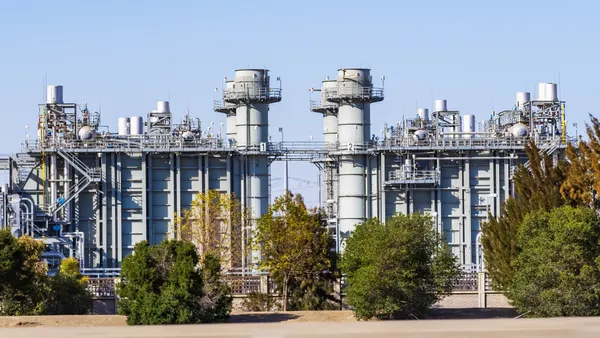Dive Brief:
- California lawmakers have advanced legislation to create a non-profit public benefit corporation that could take over Pacific Gas & Electric (PG&E) if the utility is unable to emerge from bankruptcy or fails to meet safety obligations down the road.
- State Sen. Jerry Hill, D, who introduced Senate Bill (SB) 350 in February, said at a hearing Monday that he hopes the bill will never be needed, since that would mean PG&E has failed the state again. "And we all know that the state cannot afford for PG&E to fail us again without having a backstop in place," he added.
- State senators voted to concur amendments to the bill made in the state assembly, and the bill is now set to head to California Gov. Gavin Newsom's desk. It's likely that Newsom will sign it, according to Mark Toney, executive director of The Utility Reform Network (TURN).
Dive Insight:
SB 350, or the Golden State Energy Act, would create an entity called Golden State Energy that could acquire PG&E if the utility is not able to exit bankruptcy by Sept. 30, or fails to meet safety obligations that the California Public Utilities Commission outlined in its decision approving the company's Chapter 11 reorganization plan, which could lead to regulators revoking its certificate of public convenience and necessity, among other things.
The bill would give the CPUC the authority to petition a court to appoint a receiver for PG&E if the commission determines it's warranted. And the purpose of the legislature is to "make sure there is an entity in place, that is not an instrumentality of the state, that can be in a position… to facilitate an easy transition," Hill said at a hearing Monday.
Golden State Energy would be a ratepayer-owned company subject to the CPUC's regulation, and its initial board would include five members appointed by Newsom, and four by the legislature. Future boards, however, would transition to six members elected by customers of the corporation and three appointed by the legislature and governor.
PG&E, which received bankruptcy court approval of its reorganization plan in late June, does not have a formal support or oppose position on the bill, spokesperson James Noonan told Utility Dive in an email. PG&E said in a statement that it has worked closely with California's leadership to refine and strengthen the plan, which has been supported by Newsom.
"We intend to implement our Plan, become a new and transformed company that is positioned to meet our commitments to California and our customers and, ultimately, render this legislation unnecessary," PG&E stated.
State Sen. John Moorlach, R, vice chair of California's Senate Standing Committee on Energy, Utilities and Communications, raised concerns Monday that the bill appears to allow the state to nationalize a company.
"We have one of the largest unrestricted net deficits and I'm just really concerned about whether we're capable of actually running an operation of this substance," he said.
But the bill saw support from other lawmakers, like State Sen. Scott Wiener, D, who has previously introduced proposed legislation to turn PG&E into a publicly-owned utility. Although his preference is to immediately start the process of turning PG&E into a public benefit corporation, "I think this is the next best approach — to say we'll give you the one more chance, but then you will become a public benefit corporation if you don't get it together," he said.
TURN largely supported the bill, although the group has some concerns that the process for taking over PG&E in the event of a catastrophe could take too long. Additionally, Toney pointed out that the ratepayers who could eventually own Golden State Energy would be exposed to wildfire liability. But PG&E shareholders will still be required to contribute to California's $21 billion wildfire fund, he noted.
"The advantage of this situation is we're getting shareholder money upfront," Toney added.
The bill provides hope for organizations that are working on environmental justice issues, Jose Torres, energy equity program manager at the California Environmental Justice Alliance (CEJA), told Utility Dive. But CEJA is looking for the bill to include more measures that would hold the new Golden State Energy accountable, including a concrete trigger for the transition to the new entity, a governance structure that includes frontline communities, and protections for ratepayers.
"Our perspective is ratepayers shouldn't have to foot the bill for any of the wrongdoings of PG&E, regardless of whether it's PG&E or GSE," Gwen Chang, outreach and curriculum manager for solar on multi-family affordable housing work at CEJA, added.














